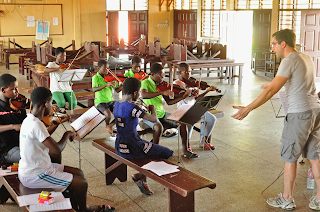The Unspoken War
I wanted to find out more, I wanted to hear in first person what
people had to say, I wanted to know some first hand experiences. I don’t think
anyone can forget the images on TV of young children with AK47's, or those of
victims bearing the mark of the rebel revenge in the form of amputations.
Perhaps to a foreigner they’d be more open, I thought, at least to educate me
about what the news didn’t tell us. There is an unashamed voyeurism to anyone
that arrives for the first time in a place where such extraordinary events took
place.
I found myself asking questions and very quickly tiptoeing
in uncharted territory of conversations, where too many details are omitted,
partly because many of them are self-explanatory to those that lived through
this, and partly because some of the particular details are too grotesque to
repeat. I knew for example that the
correct historical reference, the politically correct term, for the 10-year
bloodshed is the conflict, and not
civil war, and I tried to use this term whenever it was mentioned. Sierra
Leoneans, however mostly smiled awkwardly when I used these words and in turn
just called it the war (although
sometimes people made reference to it simply by saying “when the rebels came”).
I quickly found out that I shouldn’t ask people what were they doing in 1998,
the worse time of the war, because the fact that they are alive now means they
made it through that year. I learned to decipher some of the answers and
statements and fill in the gaps, for example “this is where we used to live
before the war” could mean that the previous home was destroyed or ruined during
the conflict, or that “the time I was in Guinea” usually refers to refugee
camps. And that is the extent of the conversations about this topic. No people
in the street with intimate details about their losses written on a piece of
paper begging for money, no tearful confessions to the visitor about the hard
times of the past.
To start with, I interpreted all this as the result of a
strong nation having recovered and moved forward remarkably quickly. But maybe the
truth is actually the reverse. Perhaps it is because the wounds are still too
fresh, and because the nation desires to move forward and eventually recover
entirely, that the past is unspoken. “We are peaceful people”, everyone agrees,
and the past is simply not spoken of.
There is also the fact that reconciliation and peace are
still fragile. My friend Alusine once wanted to write a book while he was a
teenager, about his horrific experiences, to share his personal story with
young people that perhaps had been luckier than him. But his friends convinced
him that it was a very bad idea, that he would be finger-pointed as one of the
bad guys, that we would be branded, that he could even face criminal charges for
his role, even if he was a child when it all happened. The stories are
impossible to forget and very hard to repeat, and Alusine burned the pages
he had written.
“Now you are with us”, he said to me one afternoon over
lunch. I felt proud and honoured for his hospitable remark and I thanked him.
He smiled and continued: “Now you are one of us, and if you should ever wish to
leave us, you will lose your life.” My blood froze, and I realised these words
were not meant for me. This was the rebel commander talking to the new recruits,
a group of 70-80 young boys and girls abducted from their homes, during the
first night of their captivity. The commander pronounced these words in a slow, calm
voice, while taking deep puffs from his marijuana joint between words.
The welcoming had started with relentless beatings, to teach the first lesson
of discipline, and as soon as the commander finished his welcome speech, the new
recruits were injected with drugs. I
asked Alusine how many of these children, that like him were “recruited” that
day did he think had survived, and still smiling he said that certainly not
more than half. One day, years later, he met one of them by chance in the
street. They hugged, looked each other in the eyes for a few moments and said
quietly “So, you made it”. Then each one carried on his own way.
One evening towards the end of my stay in the country I was
talking with Alusine and a second friend, Mr. Ali, about foreigners in Sierra
Leone in the 90's, and what was the involvement of other countries in the
conflict. To my pleasant surprise, they
both seemed more eager to talk about politics, and share their views and
opinions energetically. At an unexpected moment, in the middle of a seemingly
innocent part of the conversation, Alusine suddenly stopped talking. He was
silent for a couple of minutes, and then with a load moan he broke down in tears.
He cried like I have never seen someone cry before and he kept weeping for a
long time. For 15 or 20 minutes his whole body was shaking like a fish out of
the water, while Mr. Ali kept saying to him in Krio, “Take courage Alusine, take
courage.” At some point Mr. Ali turned to me and whispered, “this is why we don’t
talk about the war here, Mr. Panos.”

When you think about this, the memories of wildfloks is hardly to narrate. I will one day inspired Victims in other parts of the world.
ReplyDelete